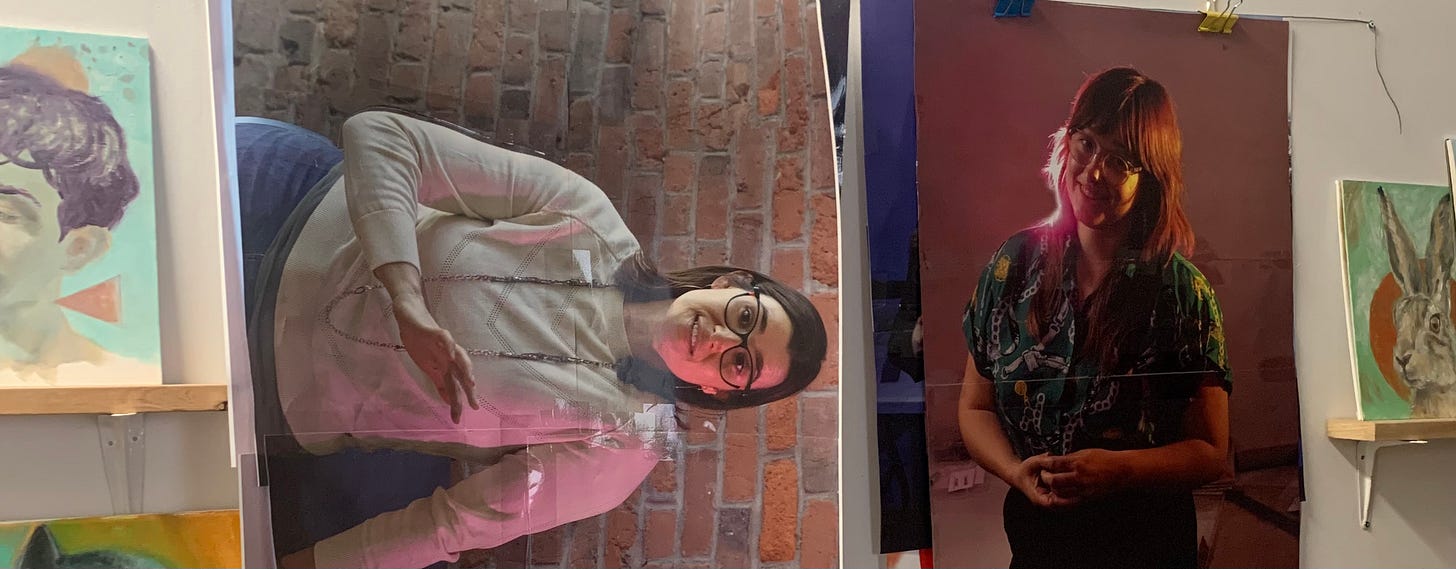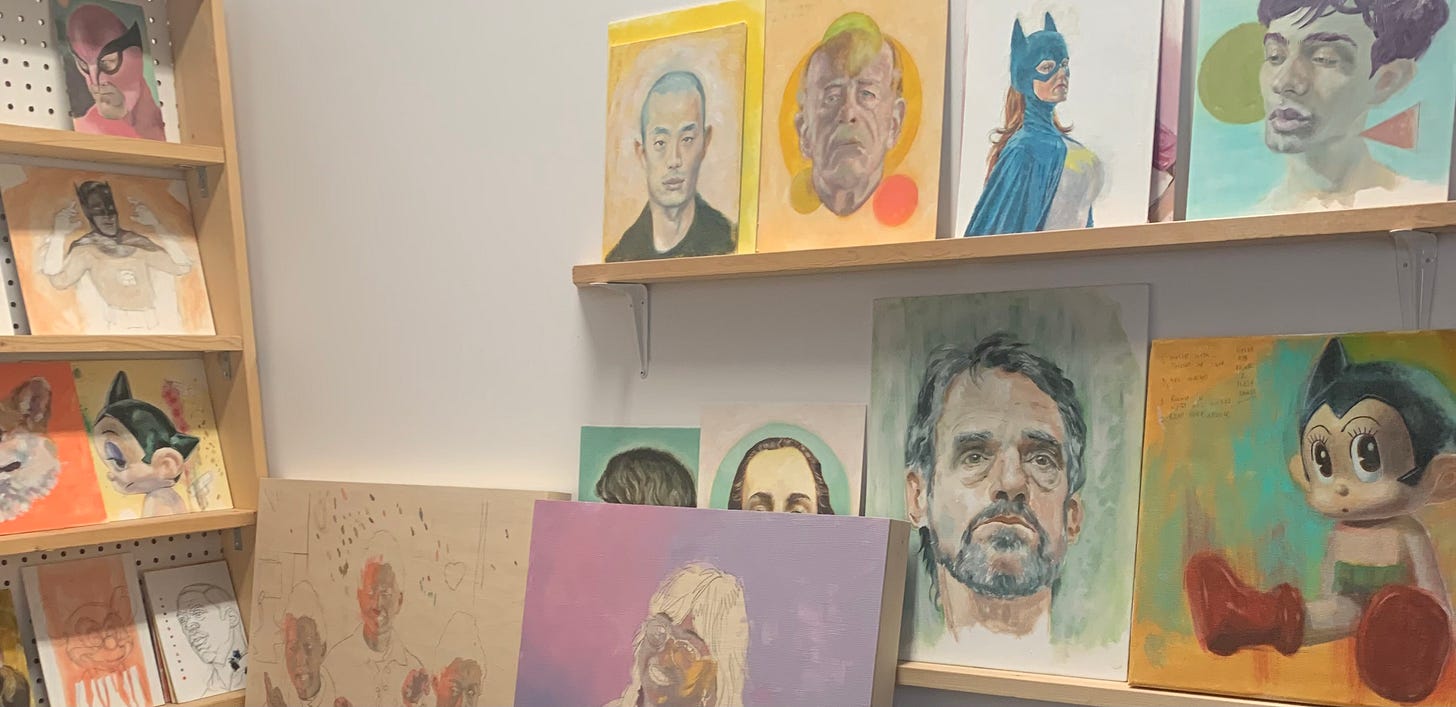MW Bowen is a local Painter. If you’re like me, you may have come across him through street art. Riffs on pop culture, funny and playful wheat pastes have adorned our city for years. Now he’s working with artist David Vegt to present a series of portraits of locals who make the city a better place. It’s called Habitual, and it opens on August 25 at the Zoe Pawlak Gallery 1675 w 2nd ave, Vancouver. MW Bowen and I sat down to chat about the show and how he’s evolved as an artist.
You're doing a gallery show with David Vegt called Habitual. What's it about? What inspired it?
It was mostly David's idea, and he approached me. He wanted to do portraits of people that work in the cultural space in Vancouver who maybe don't get spotlighted as much. So, we want to do portraits of people that add to the culture of Vancouver. The name habitual kind of came from the habitual tasks you do daily and then over years that add up to your influence on the community. And then, you know, I respect Dave a lot. And he actually taught me how to paint, basically. I would go to a studio and he'd teach me the basics. So, I thought it would be a great opportunity. When you have a project that you are committed to. Especially when you're you committed with someone you really respect, you really have to complete it, right?
How did you find the subjects for your specific set of paintings?
I first started with the list of people that I could easily contact that I knew. And then I looked at the list and it was just it was 80% white people, white men. And I realized that wasn't good enough. Then I was like, okay, I'm going to look at some stuff because I have a studio in Chinatown, so I'm going to look for people doing stuff in Chinatown. So that's how I found Cold Tea Collective and also employ to empower. Christina Wong runs Employ to Empower, and it basically gives people who may be disadvantaged financially or living on the street, gives them the tools to sell their art. I think it’s mostly tools to sell their creative work. She was actually just a block away from me, but also, I found the project really cool. I called her and she was interested.
Who are some of the people that you painted?
I did want to initially paint Michelle Vaughan, who is a human rights lawyer. So, I contacted her, but then she said, Well, I am honoured, but you really should talk to Dr. Christy Sutherland, who runs the only clinic in the Downtown Eastside on Columbia and Hastings. She’s a doctor, Christy Sutherland and it’s not just a clinic, but a personal doctor to like 50 clients in the Downtown Eastside. Like your family doctor, that's pretty rare in Vancouver in general, but super rare for those people. They also have harm reduction and counseling services and other things going on there. So I went and talked to her. She was awesome. I think she's from she's from the East Coast, either Nova Scotia, P.E.I. or department. She was awesome. I never would have met her or known about her project without doing this project. I'm just thinking here. I mean, one of my favourites is the street artist Sasquatch Army, of course. And maybe I won't say her name, but I'll just say her moniker. So she's a personal friend of mine, but also someone that's been working in street art in Vancouver. I'd say, like 20 years and is very prolific. Chris Benson is also one of my favourites. Used to run Hot Art Wet City. Which was my introduction to art that I related to. And also, he kind of worked tirelessly to showcase artists. Natasha Jung created Cold Tea Collective, which highlights not just in Canada but all of North America, all Asian Americans, from people working in hospice to major Hollywood stars. Just the full spectrum and just highlights people in the Asian-American community. So that's I guess that's a good.
People may know you from the work that you did as a street artist which is funny and stylized. How did street art develop you into the artist that you are right now?
I think the first time I saw Art that I really like because I didn't really go to galleries a lot when I was younger, but I saw a wheat paste by a Vancouver artist called The Dark. It really resonated with me. It was like kind of cartoony, black and white. He was probably doing some stencilling and then doing these big blow ups and putting them around town. And I saw it and I was like, Okay, I don't know anything about galleries, but I could do that because I could print it and then find out how to put a poster up. Then I was leaving my job as a designer, and before I left, I had some drawings that I'd done because I was always doing drawings, but not seriously. I had cartoony drawings and I had access to the company printer from one last week, and I printed all this stuff off and styled these big images from smaller images. I actually ran out of the toner on the laser printer doing so many prints. I think I did like over 300 prints one afternoon and then I started going out and doing it. And at first, I wasn't I was kind of like just learning. And I met some other street artists who taught me better techniques, and I did that for probably seven years. I think evolving from maybe just doing like smaller stuff to way bigger stuff and then eventually getting way up on buildings with a ladder and, and then just burnt out on it. Actually, in the final year I really got burnt out on the process and wanted to do something different.
What’s it been like, moving from street art, into portraits?
I felt limited by the stuff I was doing with painting because I was known as the pop art guy and that's how I realized I wanted to that maybe express my own ideas more. Even though I love pop art and I always will and I love all the culture around it, but I wanted to maybe express my own concepts, and I really wanted to do it not in the illustrative style, but like I wanted to I there's lots of oil painters I really admired on Instagram and I wanted to do work like them. So I just started practicing painting by myself at home. I started with acrylic paint because I was intimidated by oils and I had I probably spent like two years, but my paintings were looking not very good and I was just scared. I was really scared for like maybe two or three years that I would never be able to figure it out. And then my whole experiment would fail. I wasn't doing the street art anymore, and I wasn't doing any shows because I wasn't there yet. This is what I want to do with my life but it wasn't working out and I was like changing my whole thing, my whole practice. But then just slowly I started getting better. And big part of that was my friend Dave, who showed me some fundamentals. And from there I was able to grow. And then at this point, I guess because I took on this project, when you have to do something, you have learn fast.
The theme for the show is Habitual. What are some of the habits that you have developed as an artist?
When I first started painting, I was always trying to figure out tricks and stuff that get me in the right mindset. Or maybe I had to have a beer before I started painting or relax or exercise. And then I kind of realized, which I think maybe everyone realizes after you're trying to do art or anything for a long time that the only thing that really works is going to my studio as early as possible and then basically painting all day. Like the more hours you put in, if you go to your studio late, you get there as early as you can. For me, it's actually noon. After painting for about 4 hours, you almost get into like a flow state where it becomes easier and then you just there's more of a flow with your movements and what you're looking at. I just found that just putting in lots of work was the only thing that really prepares me. With this show, I had to interview and photograph a lot of people. The more interviews I did and the more photos I took, just the better I felt and the more confidence I had. And I guess before I would spend a lot of time dreading and feeling intimidated, especially when I didn't know how to paint, going to my studio was actually unpleasant. So that was really hard, too. But now I find if I put in 8 hours at my studio, I feel confident. I feel like I can do things and I feel like I have done something. So really boost my confidence and it makes the next time I go in way easier.
If you had unlimited resources, time, and money. What would you do?
What I want to do the most is a portrait series of people in the Downtown Eastside, and it will take a lot of resources and time because I want to have video interviews next to each portrait and then having a separate room with all the interviews. But I want to organically get to know the people. I don't want to, like, just walk up to someone or even say I was working at a place that had like free meals or something. Just ask. Can someone like, hey, kind of your portrait thing is kind of rude, especially because I think a lot of people go down there with cameras to photograph people that look different. And I know the people in that community don't like that. And they will actually tell people that don't take photos because it's not it's not cool. So anyway, I would love to do this portrait series, but I want to organically get to know people and that's going to take a lot of time. So, I guess for that project to go forward, ideally, I need a lot of time







